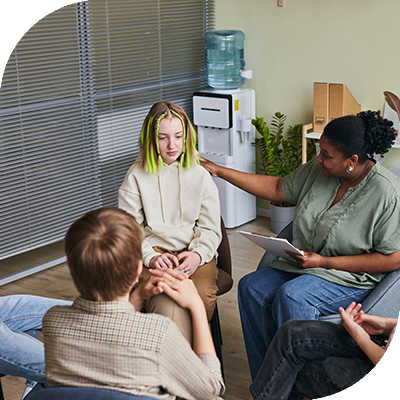Behavioral Group Therapy
for Mental Health
Group therapy is a form of psychotherapy that involves one or more therapists working with several people at once. It can be used to treat many kinds of mental health disorders, such as depression, anxiety, post-traumatic stress disorder (PTSD), and eating disorders. In behavioral group therapy, the focus is on changing patterns of behavior in order to reduce symptoms and improve quality of life. This kind of therapy generally focuses on helping individuals understand their thoughts and behaviors and how they affect their lives.
Group therapy can be an effective way to address mental health issues because it provides a supportive environment where members are able to share experiences and learn from each other’s stories. By participating in group activities and discussing their challenges openly, people in group therapy may gain insight into their own behaviors and develop self-awareness. The supportive environment of the group setting can also help individuals become more comfortable talking about their struggles with mental health, which can make it easier to address issues and seek help when needed.

What is Group Therapy?
Group therapy is a form of behavioral group psychotherapy where several individuals gather in a single session to talk about common issues and experiences. The aim of this type of therapy is to help people with mental health disorders identify patterns of behavior, develop better coping skills, and work together to improve their overall well-being.
A therapist will often lead the group, helping members to understand themselves better by providing guidance and feedback. Group therapy can also involve activities such as roleplay and art projects that may help participants express their emotions in a safe space.
What Can Be Expected in Group Therapy?
In behavioral group therapy, participants are expected to openly discuss their feelings and experiences with each other. This can be a difficult process, as it requires individuals to share something very personal with others. It is important that all members of the group feel safe and respected during these conversations. The therapist should ensure that there is no judgment or criticism in the group setting, only support, and understanding.
What are the Benefits of Group Therapy?
The benefits of behavioral group therapy are numerous and can include:
- A safe and supportive environment to talk about difficult topics with like-minded people sharing similar struggles
- Helping people learn more effective coping strategies to manage symptoms of their mental illness
- Allows individuals to build connections with their peers, reducing feelings of isolation and loneliness that often accompany mental illnesses
- Group therapy is also cost-effective in comparison to individual therapy as it usually requires fewer sessions
- Allows individuals to share ideas and test strategies with others to gain more insight and support
- Improved overall communication with others inside and outside of treatment which can lead to improved self-esteem
- Overall improved quality of life and enhanced relationships with others.

What are the Different
Types of Group Therapy?
There are a variety of group therapy types. The focus of the group will vary from facility to facility, however, these are the most common.
CBGT focuses on helping groups recognize unhealthy thought patterns and behavioral habits, so they can learn how to cope with their mental health issues in a healthy way. Over time, groups can create strategies to manage symptoms effectively.
Psychoeducational groups feature educational content to help individuals become more informed about their mental health issues. During these sessions, group members learn new skills, gain knowledge on a particular mental health topic, and discuss personal experiences related to the focus of the group.
Support group therapy provides a safe space for people to share their struggles and successes with one another. It gives participants an opportunity to receive emotional support and validation as they work on improving their mental health.
Interpersonal process group therapy focuses on interpersonal dynamics within the group. Group members work together to explore their relationships with one another and gain insight into their own behavior. It can be helpful for individuals who are struggling with issues related to social anxiety, self-esteem, communication skills, and more.
Skill development group therapy helps individuals develop the skills they need to manage their mental health. This type of group therapy can be beneficial for people with substance use disorders, eating disorders, post-traumatic stress disorder (PTSD), and other behavioral health issues. Participants may learn coping strategies such as relaxation techniques, thought-stopping, and problem-solving.
How is Group Therapy Part of a
Mental Health Treatment Plan?
Other forms of therapy that can be used in conjunction with group therapy for mental illness include cognitive behavioral therapy (CBT), dialectical behavioral therapy (DBT), holistic therapies (art therapy, wilderness therapy, yoga), and family counseling. These therapies focus on helping individuals recognize and manage negative thought patterns, learn how to better communicate, develop healthier coping strategies, and work through unresolved emotions. When combined with group therapy, these treatments can provide a comprehensive approach to treating mental health issues.
While each type of treatment works differently for different people, combining various forms of therapy can help individuals better deal with their mental health issues. In group therapy, participants learn from each other through shared experiences and by gaining insight into the behavioral patterns of others. This provides an opportunity for members to offer support to one another as well as gain a better understanding of themselves.

Contact Hidden Strength Behavioral Health
to Learn More About Group Therapy
Hidden Strength offers a variety of therapy options to help individuals overcome challenges related to mental health conditions. Group therapy is available as part of a comprehensive treatment or as a way to manage your mental health for ongoing support. To learn more about group therapy contact us today.



